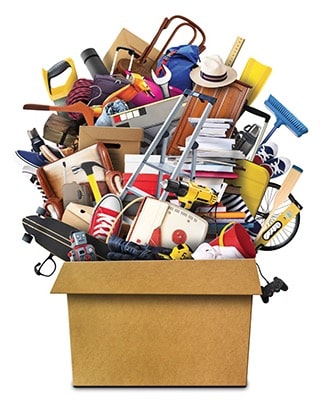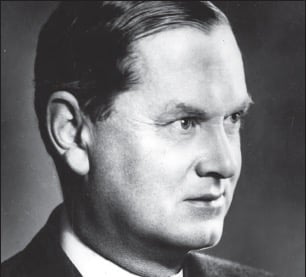It’s hard to find room for God in your life when it’s overstuffed with, well, stuff.
Ours — to use a modern term — is a “first-world problem.” But that’s not to say it isn’t a problem. It’s a concern that hit the public’s consciousness in recent years with articles, news reports, websites and books on simplifying and decluttering our homes.
Along with the how-to is the why-to. Psychological studies and reports delve into the relationship between a cluttered home and a cluttered mind. Countering these reports are sidebar articles that point out this or that world-famous genius was pretty much a packrat, or at least his or her desk looked that way.
In many ways, neatness doesn’t count. And, in many, simplicity and priorities do. Or, as Jesus put it:
“Do not store up for yourselves treasures on earth, where moth and decay destroy, and thieves break in and steal. But store up treasures in heaven, where neither moth nor decay destroys, nor thieves break in and steal. For where your treasure is, there also will your heart be” (Mt 6:19-21).
And: “He summoned the Twelve and began to send them out two by two and gave them authority over unclean spirits. He instructed them to take nothing for the journey but a walking stick — no food, no sack, no money in their belts. They were, however, to wear sandals but not a second tunic” (Mk 6:7-9).
Jesus is telling us we need to pay attention to what matters because it does matter. On the other hand, we all know, in theory:
What a mistake it would be to start falling in love with things. “Not a chance. But have you seen the latest smartphone that can … !?”
What a mistake it would be to think: “Hot dog, with that salary bump I got it made now. I’m going to get the biggest and baddest … !”
What a mistake it would be to pray: “What I really want, Lord, is to be your faithful disciple, but we all need our creature comforts. Am I right, or am I right?”
What to do, and not do? A few points to consider:
– It’s taken you years to get to where you are in The Land of Stuff. It will take some time to find your way out of it.
– It can help to see every small step as a victory, every little action as a prayer.
– You get to be practical and prophetic. (How about that!) Practical in ways to “de-stuff” your life; prophetic — that is showing others what is true — by setting an example of the benefits of not just getting by, but of thriving, on less.
– You already know the spiritual and temporal values of giving away what you no longer need. (A lot of those coats, sweaters and sweatshirts in the closet, for example.)
– The articles, news reports, websites and books can help you learn how to eliminate clutter (that is, get rid of stuff), but the basics are pretty simple. Not to say easy. Ask yourself: “What can I do without? Why am I keeping this? What would Jesus — and every saint since the founding of the Church — say and do?”
– A part of what you’re doing is rewriting your personal definition of “need.” “Do I need all these pairs of shoes? Are there others who need them more than I do? Do I need to make this donation of items for my own spiritual good as much as for the physical good of others?”
– If you and your home don’t need more stuff, you can ask others not to give you stuff, that is, physical items. So, you have Christmas, a birthday or anniversary coming up? When they ask, “What can we get you?”, you can say a donation to one of your favorite charities or causes.
Like what you’re reading? Subscribe now in print or digital.
– Raise the white flag and let the Joneses win. Quit trying to materially keep up with others. Someone will always have newer, nicer, better stuff than your stuff — just as someone will always be smarter, richer, cuter and have perfect teeth. It’s better to be known for kindness and generosity.
– This isn’t to say you have to be destitute. God doesn’t ask that of us. Nor do you have to give the heave-ho to items with sentimental value. What you can do, if you’re getting on in years, is consider letting members of the younger generation “inherit” some items now.
– And finally, less worry about stuff (getting more, replacing, maintaining and so on) means more time and ability to focus on other things: prayer, Scripture, Mass, family, service to others, etc. Your heart, your mind, your soul. The Father, the Son, and the Holy Spirit.
You know. The good stuff.
| Pope Francis: Materialism Robs Us of Our Humanity |
|---|
|
“Woe to the complacent in Zion, to those who feel secure … lying upon beds of ivory!” (Am 6:1,4). They eat, they drink, they sing, they play and they care nothing about other people’s troubles. These are harsh words which the prophet Amos speaks, yet they warn us about a danger that all of us face. What is it that this messenger of God denounces; what does he want his contemporaries, and ourselves today, to realize? The danger of complacency, comfort, worldliness in our lifestyles and in our hearts, of making our well-being the most important thing in our lives. This was the case of the rich man in the Gospel [cf. Lk 16:19-31], who dressed in fine garments and daily indulged in sumptuous banquets; this was what was important for him. And the poor man at his doorstep who had nothing to relieve his hunger? That was none of his business, it didn’t concern him. Whenever material things, money, worldliness, become the center of our lives, they take hold of us, they possess us; we lose our very identity as human beings. Think of it: The rich man in the Gospel has no name, he is simply “a rich man.” Material things, his possessions, are his face; he has nothing else. Let’s try to think: How does something like this happen? How do some people, perhaps ourselves included, end up becoming self-absorbed and finding security in material things which ultimately rob us of our face, our human face? This is what happens when we become complacent, when we no longer remember God. “Woe to the complacent in Zion,” says the prophet. If we don’t think about God, everything ends up flat, everything ends up being about “me” and my own comfort. Life, the world, other people, all of these become unreal, they no longer matter, everything boils down to one thing: having. — Pope Francis’ Mass homily from Sept. 29, 2013, St. Peter’s Square |



